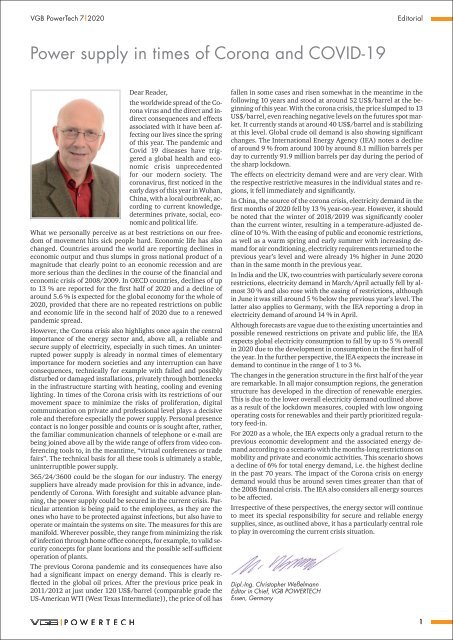VGB POWERTECH 7 (2020) - International Journal for Generation and Storage of Electricity and Heat
VGB PowerTech - International Journal for Generation and Storage of Electricity and Heat. Issue 7 (2020). Technical Journal of the VGB PowerTech Association. Energy is us! Maintenance. Thermal waste utilisation
VGB PowerTech - International Journal for Generation and Storage of Electricity and Heat. Issue 7 (2020).
Technical Journal of the VGB PowerTech Association. Energy is us!
Maintenance. Thermal waste utilisation
Create successful ePaper yourself
Turn your PDF publications into a flip-book with our unique Google optimized e-Paper software.
<strong>VGB</strong> PowerTech 7 l <strong>2020</strong><br />
Editorial<br />
Power supply in times <strong>of</strong> Corona <strong>and</strong> COVID-19<br />
Dear Reader,<br />
the worldwide spread <strong>of</strong> the Corona<br />
virus <strong>and</strong> the direct <strong>and</strong> indirect<br />
consequences <strong>and</strong> effects<br />
associated with it have been affecting<br />
our lives since the spring<br />
<strong>of</strong> this year. The p<strong>and</strong>emic <strong>and</strong><br />
Covid 19 diseases have triggered<br />
a global health <strong>and</strong> economic<br />
crisis unprecedented<br />
<strong>for</strong> our modern society. The<br />
coronavirus, first noticed in the<br />
early days <strong>of</strong> this year in Wuhan,<br />
China, with a local outbreak, according<br />
to current knowledge,<br />
determines private, social, economic<br />
<strong>and</strong> political life.<br />
What we personally perceive as at best restrictions on our freedom<br />
<strong>of</strong> movement hits sick people hard. Economic life has also<br />
changed. Countries around the world are reporting declines in<br />
economic output <strong>and</strong> thus slumps in gross national product <strong>of</strong> a<br />
magnitude that clearly point to an economic recession <strong>and</strong> are<br />
more serious than the declines in the course <strong>of</strong> the financial <strong>and</strong><br />
economic crisis <strong>of</strong> 2008/2009. In OECD countries, declines <strong>of</strong> up<br />
to 13 % are reported <strong>for</strong> the first half <strong>of</strong> <strong>2020</strong> <strong>and</strong> a decline <strong>of</strong><br />
around 5.6 % is expected <strong>for</strong> the global economy <strong>for</strong> the whole <strong>of</strong><br />
<strong>2020</strong>, provided that there are no repeated restrictions on public<br />
<strong>and</strong> economic life in the second half <strong>of</strong> <strong>2020</strong> due to a renewed<br />
p<strong>and</strong>emic spread.<br />
However, the Corona crisis also highlights once again the central<br />
importance <strong>of</strong> the energy sector <strong>and</strong>, above all, a reliable <strong>and</strong><br />
secure supply <strong>of</strong> electricity, especially in such times. An uninterrupted<br />
power supply is already in normal times <strong>of</strong> elementary<br />
importance <strong>for</strong> modern societies <strong>and</strong> any interruption can have<br />
consequences, technically <strong>for</strong> example with failed <strong>and</strong> possibly<br />
disturbed or damaged installations, privately through bottlenecks<br />
in the infrastructure starting with heating, cooling <strong>and</strong> evening<br />
lighting. In times <strong>of</strong> the Corona crisis with its restrictions <strong>of</strong> our<br />
movement space to minimize the risks <strong>of</strong> proliferation, digital<br />
communication on private <strong>and</strong> pr<strong>of</strong>essional level plays a decisive<br />
role <strong>and</strong> there<strong>for</strong>e especially the power supply. Personal presence<br />
contact is no longer possible <strong>and</strong> counts or is sought after, rather,<br />
the familiar communication channels <strong>of</strong> telephone or e-mail are<br />
being joined above all by the wide range <strong>of</strong> <strong>of</strong>fers from video conferencing<br />
tools to, in the meantime, “virtual conferences or trade<br />
fairs”. The technical basis <strong>for</strong> all these tools is ultimately a stable,<br />
uninterruptible power supply.<br />
365/24/3600 could be the slogan <strong>for</strong> our industry. The energy<br />
suppliers have already made provision <strong>for</strong> this in advance, independently<br />
<strong>of</strong> Corona. With <strong>for</strong>esight <strong>and</strong> suitable advance planning,<br />
the power supply could be secured in the current crisis. Particular<br />
attention is being paid to the employees, as they are the<br />
ones who have to be protected against infections, but also have to<br />
operate or maintain the systems on site. The measures <strong>for</strong> this are<br />
manifold. Wherever possible, they range from minimizing the risk<br />
<strong>of</strong> infection through home <strong>of</strong>fice concepts, <strong>for</strong> example, to valid security<br />
concepts <strong>for</strong> plant locations <strong>and</strong> the possible self-sufficient<br />
operation <strong>of</strong> plants.<br />
The previous Corona p<strong>and</strong>emic <strong>and</strong> its consequences have also<br />
had a significant impact on energy dem<strong>and</strong>. This is clearly reflected<br />
in the global oil prices. After the previous price peak in<br />
2011/2012 at just under 120 US$/barrel (comparable grade the<br />
US-American WTI (West Texas Intermediate)), the price <strong>of</strong> oil has<br />
fallen in some cases <strong>and</strong> risen somewhat in the meantime in the<br />
following 10 years <strong>and</strong> stood at around 52 US$/barrel at the beginning<br />
<strong>of</strong> this year. With the corona crisis, the price slumped to 13<br />
US$/barrel, even reaching negative levels on the futures spot market.<br />
It currently st<strong>and</strong>s at around 40 US$/barrel <strong>and</strong> is stabilizing<br />
at this level. Global crude oil dem<strong>and</strong> is also showing significant<br />
changes. The <strong>International</strong> Energy Agency (IEA) notes a decline<br />
<strong>of</strong> around 9 % from around 100 by around 8.1 million barrels per<br />
day to currently 91.9 million barrels per day during the period <strong>of</strong><br />
the sharp lockdown.<br />
The effects on electricity dem<strong>and</strong> were <strong>and</strong> are very clear. With<br />
the respective restrictive measures in the individual states <strong>and</strong> regions,<br />
it fell immediately <strong>and</strong> significantly.<br />
In China, the source <strong>of</strong> the corona crisis, electricity dem<strong>and</strong> in the<br />
first months <strong>of</strong> <strong>2020</strong> fell by 13 % year-on-year. However, it should<br />
be noted that the winter <strong>of</strong> 2018/2019 was significantly cooler<br />
than the current winter, resulting in a temperature-adjusted decline<br />
<strong>of</strong> 10 %. With the easing <strong>of</strong> public <strong>and</strong> economic restrictions,<br />
as well as a warm spring <strong>and</strong> early summer with increasing dem<strong>and</strong><br />
<strong>for</strong> air conditioning, electricity requirements returned to the<br />
previous year’s level <strong>and</strong> were already 1% higher in June <strong>2020</strong><br />
than in the same month in the previous year.<br />
In India <strong>and</strong> the UK, two countries with particularly severe corona<br />
restrictions, electricity dem<strong>and</strong> in March/April actually fell by almost<br />
30 % <strong>and</strong> also rose with the easing <strong>of</strong> restrictions, although<br />
in June it was still around 5 % below the previous year’s level. The<br />
latter also applies to Germany, with the IEA reporting a drop in<br />
electricity dem<strong>and</strong> <strong>of</strong> around 14 % in April.<br />
Although <strong>for</strong>ecasts are vague due to the existing uncertainties <strong>and</strong><br />
possible renewed restrictions on private <strong>and</strong> public life, the IEA<br />
expects global electricity consumption to fall by up to 5 % overall<br />
in <strong>2020</strong> due to the development in consumption in the first half <strong>of</strong><br />
the year. In the further perspective, the IEA expects the increase in<br />
dem<strong>and</strong> to continue in the range <strong>of</strong> 1 to 3 %.<br />
The changes in the generation structure in the first half <strong>of</strong> the year<br />
are remarkable. In all major consumption regions, the generation<br />
structure has developed in the direction <strong>of</strong> renewable energies.<br />
This is due to the lower overall electricity dem<strong>and</strong> outlined above<br />
as a result <strong>of</strong> the lockdown measures, coupled with low ongoing<br />
operating costs <strong>for</strong> renewables <strong>and</strong> their partly prioritized regulatory<br />
feed-in.<br />
For <strong>2020</strong> as a whole, the IEA expects only a gradual return to the<br />
previous economic development <strong>and</strong> the associated energy dem<strong>and</strong><br />
according to a scenario with the months-long restrictions on<br />
mobility <strong>and</strong> private <strong>and</strong> economic activities. This scenario shows<br />
a decline <strong>of</strong> 6% <strong>for</strong> total energy dem<strong>and</strong>, i.e. the highest decline<br />
in the past 70 years. The impact <strong>of</strong> the Corona crisis on energy<br />
dem<strong>and</strong> would thus be around seven times greater than that <strong>of</strong><br />
the 2008 financial crisis. The IEA also considers all energy sources<br />
to be affected.<br />
Irrespective <strong>of</strong> these perspectives, the energy sector will continue<br />
to meet its special responsibility <strong>for</strong> secure <strong>and</strong> reliable energy<br />
supplies, since, as outlined above, it has a particularly central role<br />
to play in overcoming the current crisis situation.<br />
Dipl.-Ing. Christopher Weßelmann<br />
Editor in Chief, <strong>VGB</strong> <strong>POWERTECH</strong><br />
Essen, Germany<br />
1


















